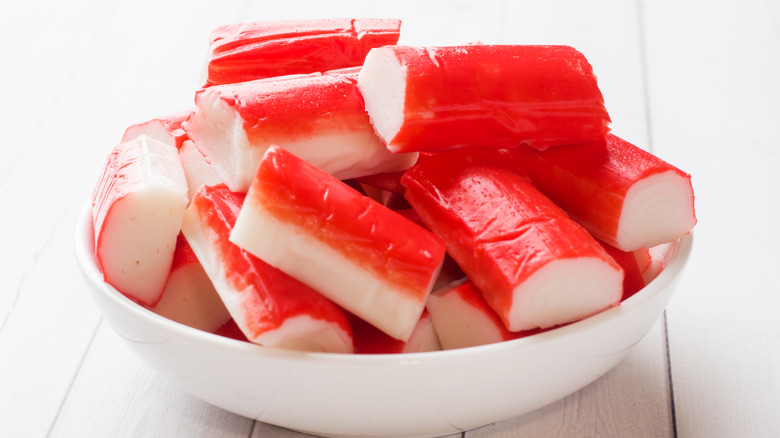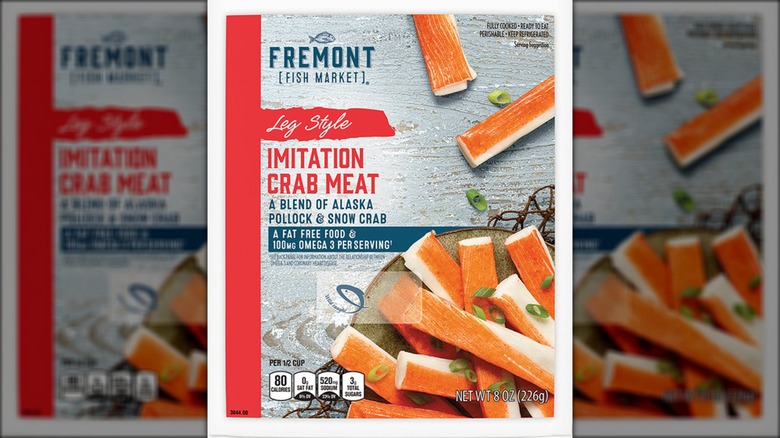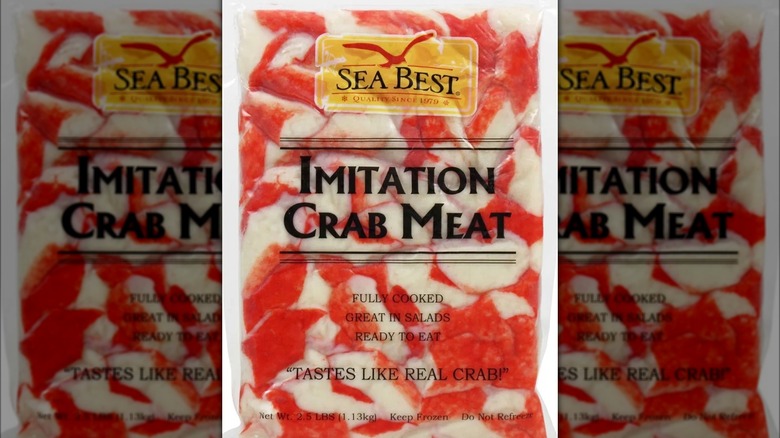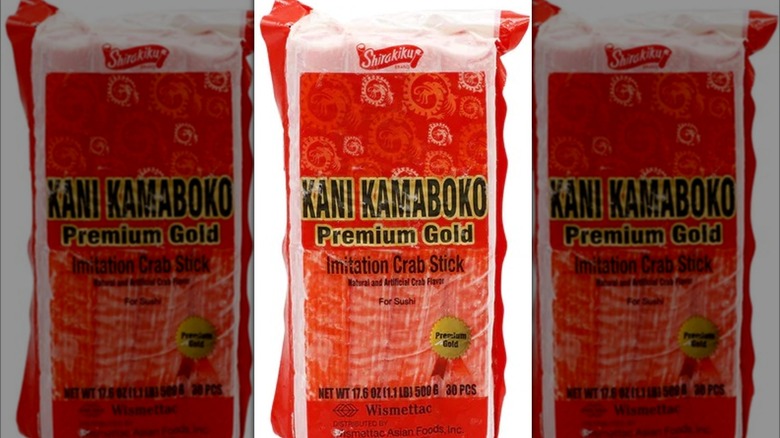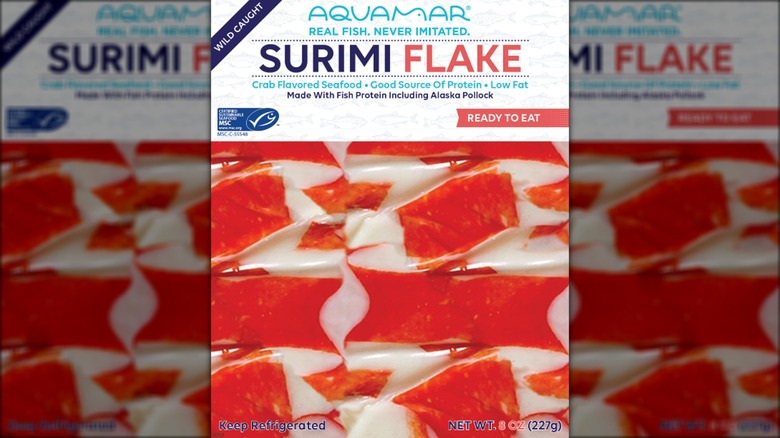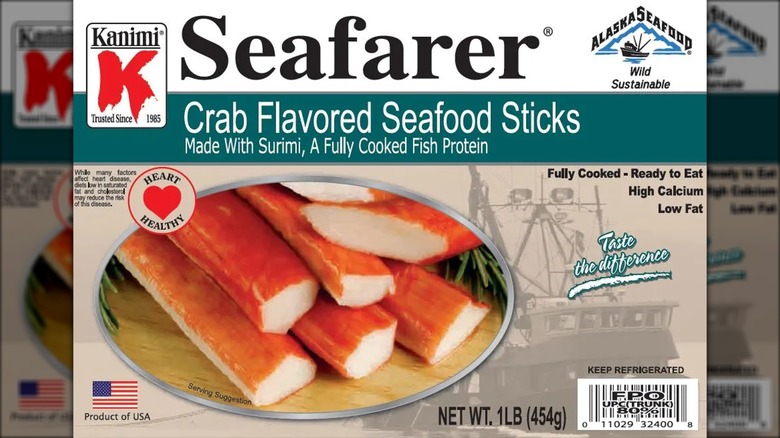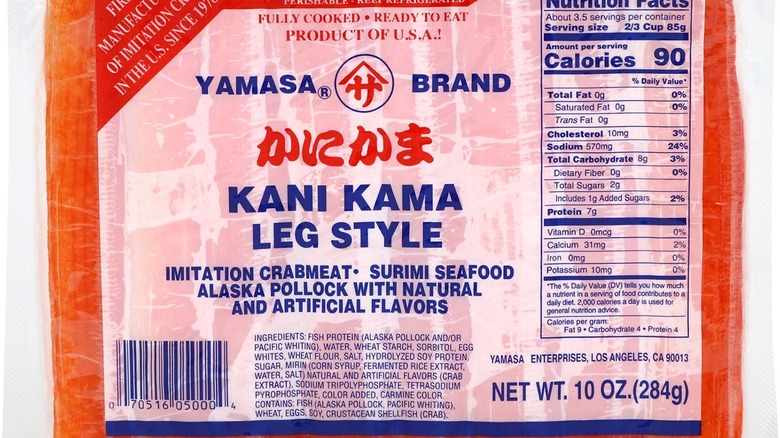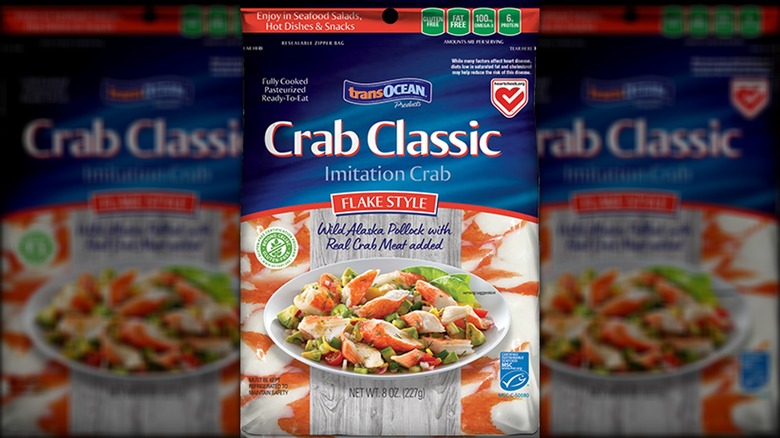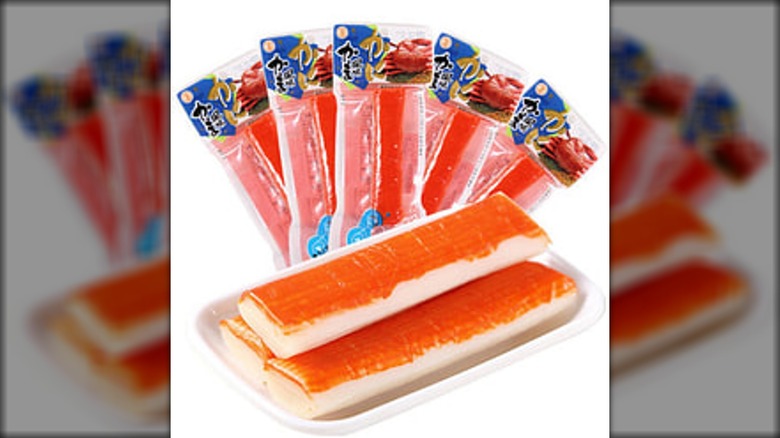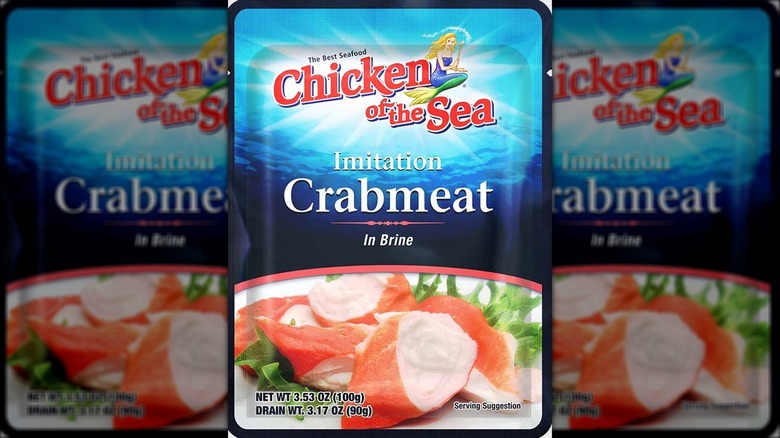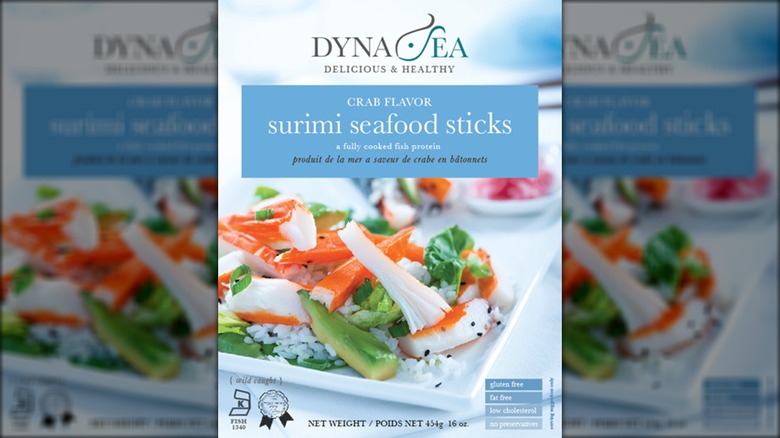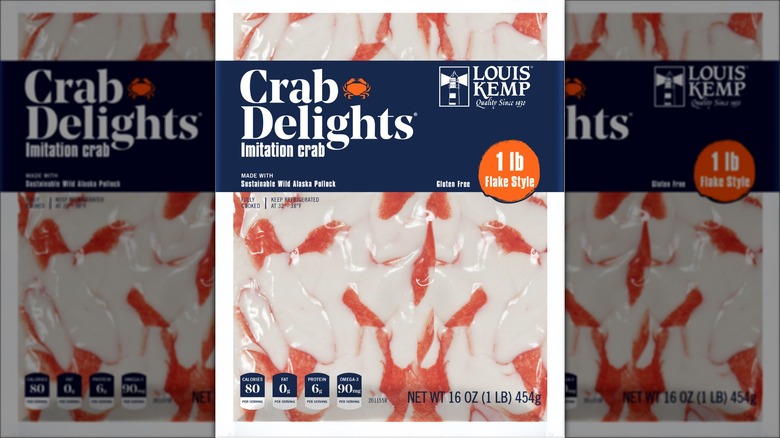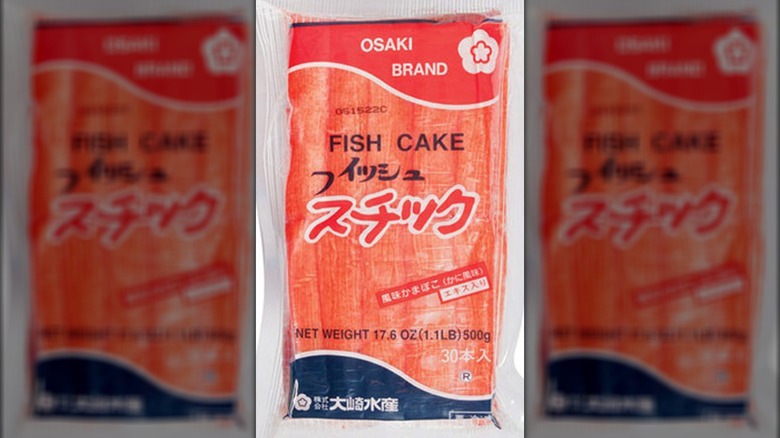Imitation Crab Brands Ranked From Worst To Best, According To Customers
We may receive a commission on purchases made from links.
If you've ever picked up a random package of imitation crab on a whim, you've likely noticed that they're not all created equal. One of the biggest mistakes you can make with imitation crab is choosing the wrong brand. But how do you know which ones have the best flavor? Honestly, there's not any one common denominator that the best or the worst brands have. So, you have to look at what customers say about each brand and notice what proportion speaks highly of them. While most of the brands on our list are from the U.S., we've also included two Japanese brands that you may have to order online or go to an Asian market to find. The brands on our list also rely on a variety of fish types and flavoring agents to make artificial crab meat.
Making processed fish cakes (surimi) has been part of Japanese food culture for at least 1,000 years. However, imitation crab sticks that don't necessarily rely on crab meat are a much newer invention. In fact, the maker of the top brand on our list claims to be the first to be inspired to make crab-flavored surimi. While some of the lesser brands may be okay mixed into a salad or casserole, you'll want a superior brand for sushi or snacking. We hope this list allows you to make a more educated choice next time you're looking for imitation crab meat.
12. Fremont Fish Market
Fremont Fish Market (FFM) is Aldi's imitation crab meat brand. Aldi owns the FFM trademark, but there's not a whole lot of information about the company beyond that. The Environmental Working Group (EWG) gives many FFM seafood products a food rating in the one to two range (with one being best). However, this one has a score of five, with processing being the main concern.
FFM's leg-style meat contains a blend of Alaskan pollock and snow crab. People who once used it as a go-to gluten-free brand have found that the ingredient list has changed, and it's no longer as gluten-free as it once was. Some of its fillers now include wheat starch, egg whites, and potato starch. It gets its flavor from crab extract as well as sardine and anchovy oil. As with most brands, it also contains phosphates. Redditor u/Yoda-202 says, "The Freemont Fish Market imitation crab, chunk style is awful. The taste is ok, but the texture is terrible and they are so dry. Just does not compare well with the Louis Kemp or Transocean imitation crab products." A couple of Redditors found it to be slimy, which is often an indication that it has gone bad.
11. Beaver Street Fisheries
Beaver Street Fisheries (BSF) launched its Sea Best brand in 1979 and has a large number of frozen seafood products available. Unfortunately, its imitation crab meat doesn't seem to meet with the approval of the masses. BSF offers two types of imitation crabmeat: leg-style and flake-style. In addition to the expected Alaska pollock content, this product also may contain Pacific whiting. Luckily, both are on the FDA's list of fish that are low in mercury content. Its use of wheat starch also prevents it from being gluten-free. Other filler ingredients include modified tapioca starch, oat fiber, and potato starch. It gets some of its flavoring from rice wine, hydrolyzed corn/soy protein, and torula yeast. Unfortunately, it also contains phosphates and nutritionally controversial carrageenan.
While some Amazon reviewers thought it tasted great, the majority were far from impressed. One said, "[W]hen my mate & I took a bite of it, we both agreed it was dried out, grainy & tasted like nothing I have ever tasted before. It is the nastiest tasting Imitation Crab I have ever had." Another called it "Absolutely the worst garbage I have ever tasted," which explains why another reviewer ended up lobbing it straight into the garbage can.
10. Shirakiku
Wismettac Asian Foods, Inc. owns the Shirakiku brand. The company creates thousands of products for the Japanese market in North America and has been doing so since 1947. However, Wismettac Asian Foods has been in business since 1912, when it first opened in Kobe, Japan.
Shirakiku uses threadfish bream to make its imitation crab sticks. These fish come from tropical and subtropical waters in the Indo-Pacific region of the world and are actually fairly common for making surimi in Southeastern Asian countries. Shirakiku is a highly processed brand, containing five types of phosphates. Some of its filler ingredients include modified tapioca starch and eggs. It also contains MSG and soy protein for flavor.
While there are several places you can buy Shirakiku brand crab meat in person — like at H Mart — online reviews are mixed. One reviewer said it arrived smelling bad. Then again, another was happy enough with it to eat it as a snack. So, it's a toss-up when it comes to knowing if you'll get a product you'll like or not — especially if buying online. After all, buying seafood products online can sometimes be tricky when it comes to the end quality. However, this brand does work for people looking for gluten-free imitation crab since it uses tapioca starch instead of wheat products.
9. Aquamar
You can find Aquamar in a number of grocery stores. The company does its processing near New York City and Los Angeles. So, the fish have to travel a distance for processing. Aquamar has four types of surimi to offer: flaked, shredded, leg, and chunk. Aquamar imitation crab meat contains "fish protein" from either Alaskan pollock, whiting (also known as hake), or both. Some of the fillers include wheat starch, egg whites, and potato starch. Hydrolyzed soy protein and crab extract add extra flavor. Aquamar's imitation crab meat also contains phosphates. It's neither gluten-free nor safe for people with shellfish allergies since it contains blue crab extract for flavoring.
Unfortunately, there's more disappointment than love for this brand. One Google Shopping reviewer said, "The taste is off putting on [its] own but [it] falls into place when other ingredients are added." So, if it's your only choice at the supermarket, you'll want to plan to turn it into a salad, casserole, or other dish. Some people aren't that big a fan of the texture either. One reviewer who used to like the brand complained about it having "[n]ot much flavor and the texture was very rubbery. I tried to eat a little bit of it but it was not good and I threw most of it out." They said it was "[l]ike eating rubber bands." Yet another review said it was dry and had a grainy texture.
8. Kanami
The Kanami brand is owned by Aquamar, and like Aquamar, the company's processing facilities are located near Los Angeles and New York City. So, it's quite a distance from the source of its main ingredients in Alaska. While the company is constantly experimenting with its product, its reviews make it seem like this one may still need a little work.
Kanami has three varieties of crab-flavored seafood under the Seafarer label: sticks, flakes, or a mixture of flakes and chunks. The company uses pollock and Pacific whiting as well as snow crab in its imitation crab products. Its fillers come from wheat starch and egg whites. It also gets some of its flavoring from rice wine, soy or wheat proteins, as well as yeast, corn, and tomato products. Since it contains wheat starch, it's not gluten-free.
There are mixed feelings about this brand. Some feel it has a decent flavor profile and works great in recipes. However, there are also complaints that it has a weak, watery flavor and a texture that seems better suited for string cheese than for imitation crab. However, some people prefer stringy imitation crab meat to make it easy to shred, so it may be a matter of personal opinion.
7. Yamasa
In Japan, the Yamasa brand has been selling food products for 400 years. However, Yamasa Enterprises in the U.S. is a completely different company and relatively newer, having only been in operation out of Los Angeles since 1938, when Otoichi Kawana immigrated from Japan to seek his fortune. It's now in its third generation of ownership.
The Yamasa company is famous for its fish cakes. However, it also sells leg, flake, meat style products. It's made with Alaska pollock and Pacific whiting, and some of its fillers include wheat starch, flour, and egg whites. For flavoring, it also contains hydrolyzed soy protein, a Japanese rice wine called mirin, fermented rice extract, and crab extract. Thus, it's unsafe for those with a shellfish allergy. While you'll find a few ingredients in Yamasa brand surimi that you won't find in most U.S. brands, the product is made to suit American tastes. Consumers find Yamasa to not taste fishy at all. So, it can be a gateway product for people who didn't think they liked seafood or crab.
6. Trans-Ocean
Trans-Ocean has been operating out of Bellingham, Washington, since 1985. Its location in the northern area of Washington makes it as close as possible to Alaska, where it sources Alaskan pollock for its Crab Classic product line. Granted, it's a long way from the Gulf of Alaska and the Bering Sea where fishermen catch the ingredients for its imitation crab. However, the fish go for processing in Dutch Harbor, Alaska, so they're packaged fresh. The fresh flavor and ingredients shine in this product.
Trans-Ocean provides three types of imitation crab in its Crab Classic line: flake style, chunk style, or leg style. One thing that sets Trans-Ocean apart is that its imitation crab meat comes from Alaska pollock fish and golden king crab meat. Filler ingredients include potato starch, modified tapioca starch, and yam flour. Flavoring includes rice wine and extracts from blue crab, snow crab, lobster, and refined pollock fish oil. So, if you have an allergy to shellfish, this might not be the right brand for you. However, it is gluten-free. Something to note is that it does contain phosphates and carrageenan.
Even though it includes real crab meat and extracts, you will want to temper your expectations. A reviewer from Google Shopping said, "[I]f you are expecting real crab meat, you will be disappointed. BUT, if you know what imitation crab meat is, it's one of the best." However, others complain that it has a bland flavor profile.
5. Marutama
Marutama Suisan (Maruyama Fishery Company) was founded in 1961 and makes a variety of seafood products in Kurashiki, Japan. It sells its products in various fish markets in Japan. However, some Japanese online food export services like Yami export them to the U.S. If you want to try authentic Japanese imitation crab, Marutama crab sticks are a good choice. Unfortunately, buying them online means you're likely to encounter high shipment fees and run into restrictions on how many you can purchase at a time.
Marutama crab sticks come individually wrapped and ready for snacking or adding to recipes. This brand uses different fish types than what we usually see in the U.S. — cod, redfish, and Japanese sea bream. Cod, redfish, and Japanese seabream all have mild flavors, making them both great choices for imitation crab sticks. Plus, redfish adds a bit of sweetness like crab has. The majority of customers seem to be satisfied with the Marutama brand, finding its crab sticks to be delicious and tasty. Its pleasant seafood smell adds to the experience of eating these crab sticks.
4. Chicken of the Sea
Chicken of the Sea is a brand you're likely familiar with because of its prominence in the canned tuna fish aisle. Chicken of the Sea has been selling canned fish since 1914, and it's a pro at making products customers like. Plus, the company has had a dolphin-safe seafood policy since 1990. So, it's a company many of us already trust.
While most U.S. companies use Alaskan pollock as one of the main ingredients for making imitation crab, Chicken of the Sea's version is made with a different type of fish than you might expect — threadfin bream. The main filler is potato starch, and it has quite a lot of flavorings, including hydrolyzed crab protein, artificial crab flavor, MSG, and some other additives.
Chicken of the Sea packages its imitation crab in brine using foil packaging like many of its other products. An Amazon reviewer says, "I love this because it doesn't need to be refrigerated and makes a lot of humdrum meals taste great." Since it doesn't need refrigeration, it's easy to pack it for lunch or keep it in the cupboard until you're in the mood for crab. However, it does contain phosphates. This brand is also cheap enough that it's among the many good food deals you can find at some Dollar Tree stores.
3. Dyna-Sea
Dyna-Sea prides itself on offering sustainably sourced seafood. The fish the company uses in its surimi are all wild-caught and sustainably sourced in Alaska. While the Dyna-Sea factory is in New Jersey, the distance from Alaska to New Jersey doesn't seem to affect the quality of the end product. Customers seem pleased with the company's products, so Dyna-Sea is a solid choice if you find it on the supermarket shelves.
Dyna-Sea sells crab-flavored surimi seafood sticks and flakes. You'll find the ingredient list for this brand to be extremely short. It uses pollock and whiting, along with kosher crab flavor. Fillers include both potato and corn starch as well as egg whites. It's both preservative-free and gluten-free, which is good news for many customers.
Reviews for this brand are excellent. After customers try it once, they tend to become a Dyna-Sea convert. One Amazon reviewer said, "Each package contains a lot. I've made 9-10 crabcakes out of one package. I've bought them three times and will buy more!" So, even if you don't have a grocery store locally like Albertson's that sells them, they're worth seeking out online.
2. Louis Kemp
If you see Louis Kemp imitation crab in your grocery store, it's a great choice. In 2006, Louis Kemp joined forces with Trident Seafoods — a company with over 50 years of experience. The company's sustainable fishing methods allow the Environmental Working Group to give the Crab Delights line a food score of 6 out of 10, and the Alaska Delights line a food score of 4.5 (with 1 being the best score).
There are three different options in the Crab Delights line: flake style, leg style, and chunk style. Crab Delights uses Alaska Pollock and snow crab meat, flavored with mirin wine and artificial crab flavor. It uses cornstarch and egg whites for fillers. Louis Kemp also produces a flake-style option in its premium line — Alaska Delights. This line contains Alaska pollock as its main ingredient and flavoring, using potato starch for filler. The company has gone all natural with the premium option, promising a product that is free from phosphates or genetically modified ingredients. Both lines are gluten-free. So, it's easy to find one that fits the way you like to use imitation crab.
According to one reviewer of flake-style Crab Delights on Google Shopping, it "[h]as a nice fresh taste. Tastes very similar to real crab meat. Also has a long [shelf] life." There are many repeat customers for this brand since it's high quality and is versatile enough to use in various recipes. Since it comes vacuum sealed, it has a long shelf life.
1. Osaki Brand
If you're looking for the best imitation crab, you'll want to try Osaki Brand. It's imported from Japan and available online or in Asian markets. The Osaki Suisan Company got its start in 1928 in Hiroshima, Japan. While surimi and fish cakes (kamaboko) had previously existed, Osaki is famous for being the first to invent imitation crab fish sticks (kanikama) flavored with crab. The invention happened when the company was making crab- and fish-stuffed cucumbers, and someone realized they could mix leftover crab extracts with fish to make the fish taste like crab. Since its invention, the company has sold these imitation crab sticks around the world. While many companies have attempted imitation crab, none have mastered the original.
Many people seek out Osaki imitation crab for sushi. It also has the distinction of puffing up during frying, so you can coat the sticks in tempura batter for frying. These stick-shaped "cakes" come individually wrapped, and they pull apart much like string cheese for easy shredding. They're made from Alaska pollock and southern blue whiting. Wheat starch, egg whites, and corn starch are its fillers, with crab extract, rice wine, and MSG providing flavor. Phosphates are also on the ingredient list.
Redditor u/ExoticCard says, "Osaki imitation crab is top tier. Don't bother with that s*** from ShopRite." It's labeled as "fish cake," so it's easy to miss if you're looking for "imitation crab" on the label. It's juicy, sweet, and has a perfect umami flavor.
